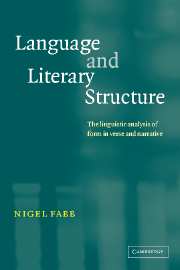7 - Complexity
Published online by Cambridge University Press: 22 September 2009
Summary
My goal in this book has been to establish what literary form is, and how it holds of a text or a performance of the text. I have proposed two fundamentally different ways in which literary form holds. The generated metrical form holds of the text by virtue of being generated by rule from a linguistic representation of the text. In contrast, the explicit literary form and the implied literary form hold of a text by virtue of being the content of thoughts about the text. The explicit form is a thought about the superficial facts of the performance such as the thought that ‘there are fourteen words with no words to their right’; the implied form is derived by inference, either by interpretive use (resemblance between two thoughts) or by modus ponens (‘if … then’ deductions based on conditionals).
These different kinds of literary form exist only because literary form holds between a person and a performance of a text, and is not a context- and userindependent and inherent fact of the text itself. This psychological status for form leads to the split between generated metrical form on the one hand and explicit and implied form on the other. More significantly, it means that since most literary form is implied form, therefore most literary form takes on the complexities, indeterminacies, ambiguities and contradictions which are characteristic of inferential processes.
- Type
- Chapter
- Information
- Language and Literary StructureThe Linguistic Analysis of Form in Verse and Narrative, pp. 215 - 218Publisher: Cambridge University PressPrint publication year: 2002



